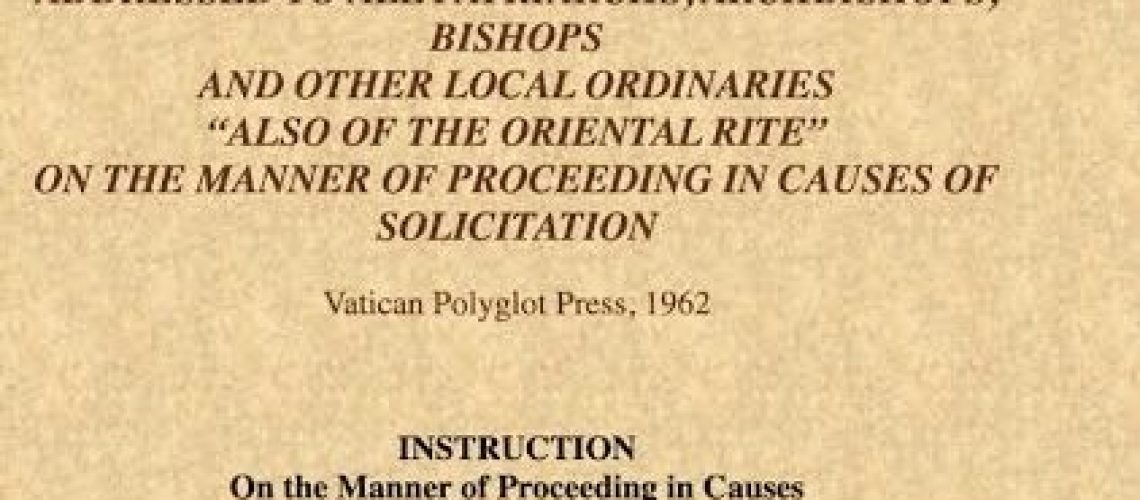Instruction Crimen Sollicitationis
To be kept carefully in the Secret Archive of the Curia for internal use.
Not to be published or augmented with commentaries.
Title: Instruction on the manner of proceeding in cases of Solicitation (Crimen Sollicitationis)
Author: Pope John XXIII, Cardinal Ottaviani
Publisher: Vatican Polyglot Press 1962
PRELIMINARY MATTERS
1. The crime of solicitation occurs whenever a priest – whether in the act itself of sacramental confession, or before or immediately after confession, on the occasion or under the pretext of confession, or even apart from confession [but] in a confessional or another place assigned or chosen for the hearing of confessions and with the semblance of hearing confessions there – has attempted to solicit or provoke a penitent, whosoever he or she may be, to immoral or indecent acts, whether by words, signs, nods, touch or a written message, to be read either at that time or afterwards, or he has impudently dared to have improper and indecent conversations or interactions with that person (Constitution Sacramentum Poenitentiae, §1).
2. Bringing this unspeakable crime to trial in first instance pertains to the local Ordinaries in whose territory the Defendant has residence (see below, Nos. 30 and 31), not only by proper right but also by special delegation of the Apostolic See;
and it is enjoined upon them, by an obligation gravely binding in conscience, to ensure that causes of this sort henceforth be introduced, treated and concluded as quickly as possible before their own tribunal. Nevertheless, for particular and grave reasons, in accordance with the norm of Canon 247, §2, these causes can also be deferred directly to the Sacred Congregation of the Holy Office, or called to itself by the same Sacred Congregation. The Defendants retain the right in any grade of trial to have recourse to the Holy Office; but such recourse does not, except in the case of an appeal, suspend the exercise of jurisdiction by a judge who has already begun to hear the cause. The judge can therefore continue to hear the cause up to the definitive sentence, unless he has ascertained that the Apostolic See has called the cause to itself (cf. Canon 1569).
3. The term “local Ordinaries” here means, each for his own territory: residential Bishops, Abbots or Prelates nullius, Administrators, Vicars and Prefects Apostolic, as well as all those who, in their absence, temporarily take their place in governance by prescription of law or by approved constitutions (Can. 198, §1). The term does not, however, include Vicars General, except by special delegation.
4. The local Ordinary is judge in these causes for Religious as well, including exempt Religious. Their Superiors are in fact strictly prohibited from involving themselves in causes pertaining to the Holy Office (Canon 501, §2). Nonetheless, without prejudice to the right of the Ordinary, this does not prevent Superiors themselves, should they discover that one of their subjects has committed a crime in the administration of the Sacrament of Penance, from being able and obliged to exercise vigilance over him; to admonish and correct him, also by means of salutary penances; and, if need be, to remove him from any ministry whatsoever. They will also be able to transfer him to another place, unless the local Ordinary has forbidden it inasmuch as a complaint has already been received and an investigation begun.
To read the full article visit:
http://www.vatican.va/resources/resources_crimen-sollicitationis-1962_en.html

